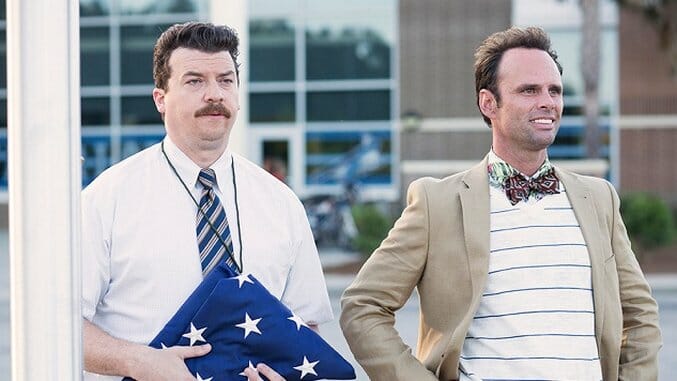Why Vice Principals Is Perfect for Binge-Watching
Images courtesy of HBO
On September 17th, the second season of HBO’s Vice Principals will kick into gear. If you missed the first season, you’re in luck: you’ve got just enough time to catch up, and more than that, you’ve got the whole season to burn through at once. Very few shows make a compelling case for binge-watching beyond being able to stay on top of the pop culture cycle, but Vice Principals is a notable exception to the rule.
The show stars Danny McBride and Walton Goggins as Neal Gamby and Lee Russell, high school vice principals jockeying for the position of principal. At first glance, there’s not that much to it. Early criticism of the show said as much, highlighting the seemingly regressive plot. The first hour or so of the show seems to put it in the unfortunately archaic lane of showcasing two underqualified white men seeking to undermine a woman—specifically a woman of color—for the sake of their own pride. The pilot alone ends with them putting aside their differences in order to work together against her, with the handshake between them framed as a triumphant gesture. But the further along the show goes, the more it becomes evident that it’s subverting the very tropes that it seems to be engaging in. The clearest sign of this is how much weight is given to the principal Gamby and Russell are trying to get rid of: as Belinda Brown, Kimberly Hebert Gregory is inarguably the true hero of the piece. Unlike Gamby and Russell, who are continually facing moral dilemmas that they either choose to ignore or take the low road on, there’s next to no reason to root against Brown. She’s a good person, and besides that, she’s a good principal.
The reason why the show is stronger as a whole is evident when taking into account the comments of its creators. Danny McBride and Jody Hill originally conceived of Vice Principals as a movie, and its expansion into a TV series still adheres to a more finite structure than many of its peers. It’s two—and only two—seasons long, and was shot all at once instead of from season to season. It makes sense, as such, that the overall thesis driving the show would be strengthened by watching it all at once instead of week to week.
-

-

-

-

-

-

-

-

-

-

-

-

-

-

-

-

-

-

-

-

-

-

-

-

-

-

-

-

-

-

-

-

-

-

-

-

-

-

-

-








































